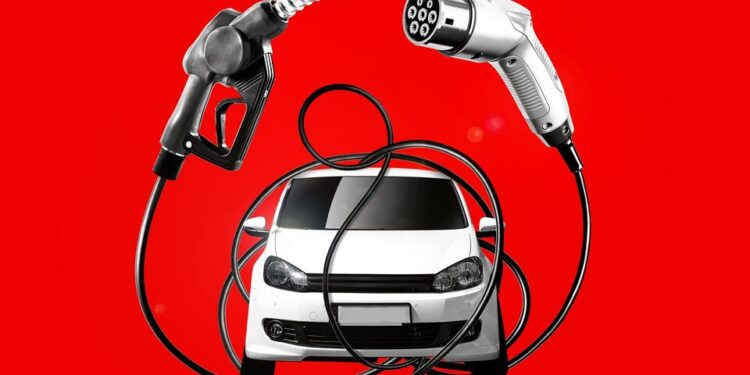Boris Johnson’s ambitious plan to ban the sale of new petrol and diesel cars by 2030 is floundering as the scale of the undertaking becomes clear. The affordability of electric cars, the need for extensive charging infrastructure, and the risk to industry jobs are just some of the hurdles that are derailing the country’s green industrial revolution. Will the U.K. be ready, asks Matt Oliver in the Telegraph, or is ‘carmageddon’ inevitable?
With a year to go before Britain hosted the Cop26 climate conference, Boris Johnson was preparing to make an eye-catching announcement.
The then-prime minister was poised to set out his 10-point plan to spark a green industrial revolution – and the centrepiece was a vow to ban the sale of new petrol and diesel cars by 2030.
A highly ambitious target, this was five years sooner than the deadline he had set just nine months earlier, which car industry bosses dismissed as “a date without a plan”.
It was also a decade before the target outlined by his predecessor, Theresa May, only two years beforehand.
“Our green industrial revolution will be powered by the wind turbines of Scotland and the northeast, propelled by the electric vehicles made in the Midlands and advanced by the latest technologies developed in Wales, so we can look ahead to a more prosperous, greener future,” Mr. Johnson said in November 2020.
His speech, the Government said, would put the U.K. on course to be the fastest G7 nation to decarbonise road transport.
Yet the new sales ban – described by the Society for Motor Manufacturers and Traders as “immensely challenging” – represented a huge gamble, with the potential to either turbocharge or tank Britain’s domestic car industry.
And astonishingly, for such a consequential policy, no detailed proposals to achieve it had actually been drawn up.
Instead, Johnson and other ministers hoped the stretching target would cement demand for electric vehicles, galvanising businesses to manufacture supplies and build the legions of chargers that would be required.
“It’s like the classic example of putting a man on the moon,” one former minister involved in the policy says.
“When Kennedy said ‘We’re going to put a man on the moon’, he did not know how they were going to get there. He just said this is the target – and they got there.”
Fast forward to today, however, and the scale of the undertaking has become clear.
Electric cars still remain unaffordable for most households, while a huge upgrade of the power grid will be needed in order to boost the number of vehicle chargers in Britain from 42,000 at present to the more than 300,000 being sought by ministers.
Meanwhile, to serve demand for vehicles domestically, around five battery ‘gigafactories’ are needed in the U.K. – with hundreds of thousands of industry jobs at risk if they are not secured.
Experts say we are now at a crossroads. A report published this week by the Climate Change Committee, the statutory Net Zero watchdog, said that rising electric car sales were promising but work to build chargers “now needs to scale up more quickly”.
Separately, industry leaders say time is running out for Britain to secure the gigafactories that will be the bedrock of its future car manufacturing base. A failure to do so, while sticking with the 2030 ban on new petrol car sales, threatens a jobs bloodbath.
As the clock ticks down, alarm is growing that Britain will simply not be ready for 2030 – and a delay is increasingly likely.
The U.K.’s commitment to reach Net Zero carbon emissions by 2050 will require emissions from vehicles to be almost eradicated.
Surface transport, including cars, accounts for the biggest chunk of Britain’s annual carbon emissions, representing 23% last year.
This was about 105 million tonnes of carbon dioxide equivalent, the Climate Change Committee’s latest report says, which was 3% up from 2021 but 8% below pre-pandemic levels.
The reduction was mostly down to increased working from home, rising fuel prices and so-called low-traffic neighbourhoods, with a small contribution from rising electric vehicle sales.
But a crunch point is fast approaching at which sales of electric cars – which have much lower lifetime emissions than petrol ones – will need to do more of the heavy lifting.
Worth reading in full.











Profanity and abuse will be removed and may lead to a permanent ban.